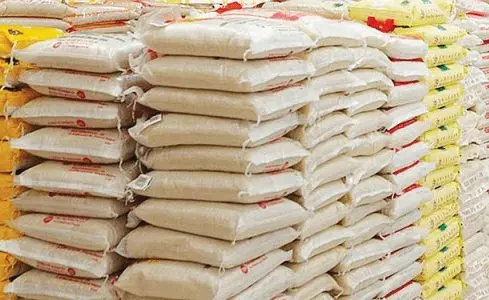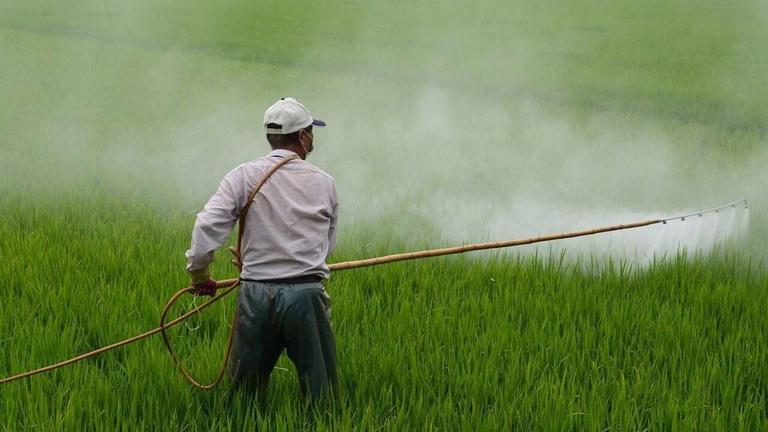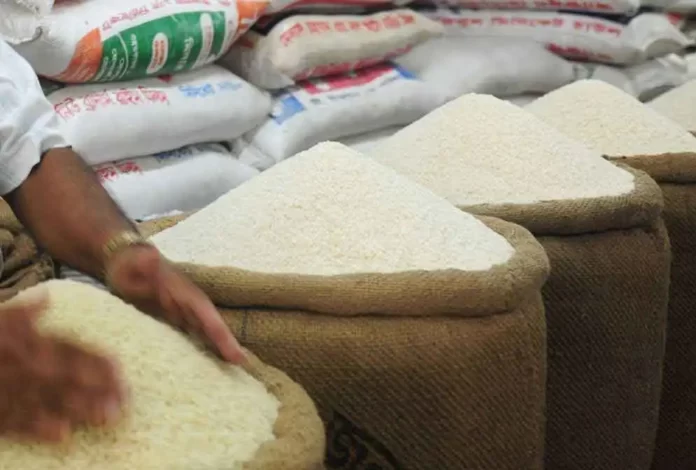Tags
From pyramids to ground zero: How rice jumped out of common man’s menu

By Gabriel Ewepu
There is no doubt that while Nigeria is one of the world’s largest consumers of rice as staple, she is far from being self-sufficient in production.
The rice value chain has been the focus of past administrations, particularly to make the country self-sufficient in rice production, but, unfortunately, there has not been significant achievement in that regard based on bedeviling factors including poor political will, smuggling, sabotage, international interference and influence. According to a report of the Food and Agriculture Organisation, FAO, Nigeria is the largest producer of rice in Africa, producing about 8,435,000 tonnes annually, followed by Egypt, Madagascar, Tanzania and Mali.
To showcase Nigeria’s capacity to produce rice for self-sufficiency and export, former President Muhammadu Buhari on January 18, 2022, through the Central Bank of Nigeria, CBN, mobilized rice farmers to assemble over 1 million bags of paddy rice in pyramids under the Anchor Borrowers Scheme, ABP, and were officially unveiled in conjunction with the Rice Farmers Association of Nigeria, RIFAN, in Abuja.
The unveiling ceremony of the rice pyramids attracted attention of Nigerians and the international community.
The CBN’s plan was to sell the rice below market prices and to bring down high prices of the commodity.
Crash
Meanwhile, Buhari, in his address at the unveiling of the rice pyramids, assured Nigerians that with the symbolic unveiling of the paddy rice pyramids, prices of rice will crash.
He maintained that the commissioning of the rice pyramids was an indication that Nigeria was making steady progress towards attainment of self-sufficiency in food production.
Buhari said, “Today rice production in Nigeria has increased to over 7.5 million metric tonnes annually. “Prior to the introduction of ABP, the average production in Nigeria between 1999 and 2015 was less than four metric tonnes annually.
“I am aware that the bags of paddy will be moving straight from here to rice milling plants across Nigeria, which leads to the release of processed rice to the markets by rice millers.
“The measure will aid our efforts at reducing the price of rice in Nigeria.
“Before this administration launched the ABP, there were only 15 standard rice mills in Nigeria. As of today, we have over 50 standard and integrated rice mills creating jobs and reducing unemployment.
“We expect additional significant output when two new mills are started in Lagos and Katsina.”
Progress
Former CBN Governor, Godwin Emefiele, in his own address at the occasion, said by virtue of assembling the single largest rice pyramids provide undisputable and unassailable evidence of significant progress under President Buhari’s food security initiatives that gives hope to Nigerians that rice issue is settled and no need for importation of the commodity.
“Beyond increasing our national output from about 5.4 million metric tonnes in 2015 to over 9 million metric tonnes in 2021, we have also significantly improved the productivity per hectare of the smallholder farmer from about 2.4 metric tonnes per ha in 2015 to between about 5 metric tonnes per ha in 2021”, he said.
Soaring price
Barely two years after the unveiling of the rice pyramids, questions remain. Why is the price of rice at over N80, 000? Was there no sustainability plan? Could it be that CBN could not effectively make rice farmers repay their loan under the ABP?
Was there any form of sabotage in the rice value chain?
Was it a political strategy to win the votes of Nigerians ahead of the 2023 general elections? Or were other factors responsible for the current high price of rice?
Stakeholders in the rice value chain, who spoke with Sunday Vanguard on the issues, shared their views about what transpired and why rice has gone out of the reach of Nigerians based on what they know and pointed out.
Intervention demands involvement of Agric Ministry – AFAN
National President, All Farmers Association of Nigeria, AFAN, Kabir Ibrahim, said their expectations were high concerning the launch of the rice pyramids in Abuja.
Ibrahim counseled that following the failure of the ABS, it is imperative for the current CBN Governor, Olayemi Cardoso, to drive agricultural interventions through the Federal Ministry of Agriculture and Food Security, which will seamlessly get to the real farmers.
He said: “We expected that the price of rice would generally come down as it was clearly abundant going by the display on pyramids.
“We advised that the paddy displayed be directly given to millers soon after the ceremony so that when milled it will be made readily available to consumers and thereby crash the price of rice generally.
“Any intervention in agriculture by the CBN should be channeled through the Federal Ministry of Agriculture and Food Security so that there will be the requisite institutional memory and expertise incorporated in it to avoid failure.
“There should be close monitoring and evaluation by the CBN and AFAN to ensure that the implementation is properly done.
“The recent action of allocating 2.1 million bags of assorted fertilizers to the FMAFS to distribute to farmers by the CBN is the right step in the right direction and therefore highly commendable.”
On boosting rice farmers’ productivity, the farmers’ leader said, “The right kind of synergy should be put in place to get all the sub-nationals to key into the programme of rice production because the activity is largely in the states and LGAs.
“Farmers should be incentivized at all levels and regardless of politics and other considerations but the attainment of rice sufficiency in Nigeria.
“Farmers should heed the advice of NiMET and the hydrological services agency on climate and flood outlook to minimize the effect of flooding and even drought.
“We hope and pray that the incident of flooding which is clearly due to climate change caused by carbon emission will be mitigated by Nigeria’s climate action aimed at reducing methane emission generally as promised at COP 28 in Dubai.
“Farmers should work assiduously to feed the ever increasing population of our country and to also partner and collaborate with others such as donor agencies and development partners to scale their productivity.”
Abandonment of ABS made rice price to skyrocket – Kebbi RIFAN Chairman
The Chairman, Kebbi RIFAN, Muhammad Sahabi, asserted that the abandonment of ABS is a major cause for the high price of rice in the market.
According to Sahabi, rice farmers do not have access to finance to boost their productivity, and as a result of the high cost of farm inputs, they have abandoned rice fields.
He said: “Before the Anchor Borrowers’ intervention by the Central Bank of Nigeria, CBN, and the Federal Government, farmers on their own bought their inputs and other things to actually support their rice farming.
“But once the CBN came with that intervention those inputs that were not affordable by our farmers were made available to them, which made their production increase, hence the rice pyramids that were seen in Abuja, which was purely by the private sector.
“After all said and done, there were complaints that rice was too expensive, and it was not true.
“At that time we were trying to block importation of rice into the country, and we were trying to rely on only our homegrown rice production, and with the tendency that it has to be a slow process.
“All the same, the price then and the current price cannot be compared.
“Since the suspension of the Anchor Borrowers Scheme in Kebbi State, rice farmers have abandoned their farms because they cannot afford the inputs, for instance, a bag of fertilizer that was sold for N6,000 is now being sold for N50,000.
“Even the water-pump engines we used to buy for N50,000 is now sold for over N100,000, and we buy a litre of petrol for N720 which was bought at N168.
“With this high cost of inputs, a poor farmer in the village cannot finance his rice production, and to feed his family now becomes difficult, and the quantity he used to send to the market is less than 10 per cent of what it used to be, and definitely it will affect the price.
“All programmes by the previous government are now abandoned or being reviewed.
“Our farmers are not able to repay the loan they accessed from the CBN, and it is not only farmers in Kebbi State but all over the country, and they are supposed to use their harvest to repay the loans but if a farmer is struggling to feed his family, what will he have to sell to repay his loan because the cost of inputs is high, some are killed, kidnapped, and no enabling environment to pay their loans.
“The price of rice will not reduce because less than 25 per cent of farmers are now back to farm in Kebbi State.
“Therefore, the volume of production is very low, and the quantity of land a farmer used to cultivate has now gone low, less than 1, 000 of what he used to cultivate, and definitely there is going to be another upsurge of price.
“In Kebbi State, rice farmers want cheaper fertilizer, agro-chemicals, irrigation facilities, solar-powered pumping machines, and others.”
Policy inconsistency impacting rice value chain – RIMAN Chairman
National President, RIFAN, Peter Dama, pointed out that one of the major causes of high cost of rice currently is traceable to policy inconsistency and made recommendations as panacea to the issue.
Dama said: “The rice pyramids that were launched were really because over 50,000 metric tonnes of paddy were produced and sold to rice millers who milled and sold to Nigerians at affordable rates of between N35,000 and N40,000 then.
“There have been challenges confronting rice farmers in the country. First and foremost is the issue of insecurity, where bandits and kidnappers have been creating problems for our farmers in the fields.
“Farmers also have challenges with high cost of inputs that have affected their ability to procure necessary inputs for their activities.
“ABS, which the Central Bank of Nigeria, CBN, introduced, was no longer functional as the interventions through single digit interest rate for loan was suspended abruptly.
“So there are no cheap funds for farmers to obtain for their activities on the farm. The impact of Anchor Borrowers Scheme on rice production was tremendous because it enabled rice farmers to produce enough for our rice mills to process, and farmers could afford inputs but with the suspension everything went down.
“Also, unfortunately, the CBN had problems of recovery of the loans that were given to farmers during the Anchor Borrowers Programme. This also affected the progress recorded in the entire programme as debtors are still being pursued to pay up.
“True, rice was supposed to be cheap because of CBN and other interventions by now but policy inconsistency has always impacted negatively on the entire rice value chain.
“The same government that brought in subsidies in agricultural production, the same government has withdrawn fuel subsidies, which is one of the major components in rice processing and milling. This singular aspect has led to the rise of everything in Nigeria and not only on rice.
“The floating of the Nigerian currency, which led to the high cost of the US Dollar, affects rice millers because to some extent rice millers have to import machinery or spare parts to take care of wear and tear in their factories.
“Generally, the high cost of production led to the high cost of rice currently in the country.”
Recommendations
“The Tinubu administration should try to reduce cost of production by way of the return of fuel subsidy, reduction in electricity tariff for manufacturers, millers and food processors, provision of adequate security to farmers in order for them to return to their farms for production.
“The administration should provide subsidies to reduce cost of production to agric businessmen with tax holiday extended to millers and food processors so that they can produce optimally for the nation to feed herself.
“All trade barriers removed to ensure smooth trading in all sectors. There is also the need to embark on research on appropriate seeds that can be cultivated.
“Equally important is the issue of climate change that is affecting all sectors of agriculture. The Nigerian government should tackle this aspect by getting experts to look into the problem rather than paying lip-service to the challenges head on in this sector.
“Finally, the need for the government to embark and pay serious attention to research and development, particularly on high yielding rice seeds with adequate irrigation services nationwide so that rice farmers can cultivate rice twice in a year, instead of depending only, on one wet season circle of cultivation of paddy rice needed by the millers to process.
“The Central Bank should continue with its Anchor Borrowers Program but this time around, they should ensure that only real farmers benefit from the programme instead of political farmers.
“The restrictions which were taken off for the importation of 43 items by the CBN should be discontinued in order to encourage our home grown products from unnecessary competition foreign imported goods and services.
“Special windows be created for agribusinesses to obtain foreign exchange rates at a more affordable price to enable millers import or replace worn out machinery and spares that are not readily available locally.
“The difficult and cumbersome conditions for obtaining bank facilities should be reduced, particularly, the issues of having to provide huge collateral before obtaining a bank facility.
“Also the CBN should ensure that each bank has an operational agric desk to take care of the needs and requests of farmers and particularly rice millers, and if the development finance department of the CBN, will be allowed to remain, honest and well experienced officers be appointed to man such departments.
“The CBN as a matter of urgency encourages the full capitalisation of the Bank of Agriculture, BoA, by the Ministry of Agriculture and Food Security so that farmers can easily reach out to this bank to obtain facilities if the CBN discontinues its Anchor Borrowers programme.”
Published Date: June 2, 2024






